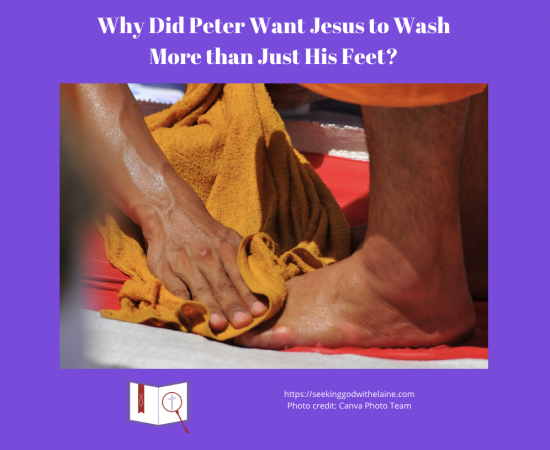After the Passover meal, Jesus washed the disciples’ feet. At first, Peter vehemently tried to stop Jesus from doing that. This devotion looks at why Peter changed his mind and wanted more than his feet washed.
Nuggets
- Feet washing was part of their hospitality customs.
- Imagine how surprised the disciples were when the Master chose to wash their feet.
- But Peter saw a problem with this picture.

Looking back, you have to love ol’ Peter. He was truly devoted to Jesus. He was the first one to say Jesus was the Christ (Mk. 8:29).
Peter’s faith was so strong that Jesus called him a rock (Mt. 16:18). He was the only disciple brave enough to jump out of the boat in Matthew 14: 28-31. No, that didn’t end well, but he at least was willing to get his feet wet.
But Peter was the friend you would call a wild card. He was impulsive, so you never knew what was coming out of his mouth. Yep, you wouldn’t want to put him on the speaker phone. You wondered if he had really thought through everything that comes out of his mouth, like at the Transfiguration (Mk. 9: 1-12).
Still, Peter was sincere. Look what happened at the Last Supper. Jesus wanted to wash the disciples’ feet. It is not a practice that has been handed down through the years. So, let’s take a minute and see what it was about.
Feet Washing
"Simon Peter exclaimed, 'Then wash my hands and head as well, Lord, not just my feet!'” (Jn. 13: 9 NLT)
Feet washing was part of their hospitality customs.
Remember, the automobile hadn’t been invented yet. Jesus and the apostles had walked from wherever they had been before. They may have just been wearing sandals, but since it was cold (Jn. 18: 18), they may have been wearing shoes.
It came after the bow, greeting, and the kiss. Water was provided so guests could wash their own feet, but normally that would be done by a slave or servant.
The Bible talks of several feet washing episodes before Jesus set to the task. Abraham offered water to his heavenly visitors in Genesis 18: 4. He must have rubbed off on Lot because the nephew did the same with the angels in Genesis 19: 2. Abigail used it as a sign of humility when David’s servants told her the king was taking her as a wife (I Sam. 25: 41).
Feet washing was also a part of the religious preparations. Exodus 30: 19-20 says, “Aaron and his sons will wash their hands and feet there. They must wash with water whenever they go into the Tabernacle to appear before the Lord and when they approach the altar to burn up their special gifts to the Lord — or they will die!.” (NLT). It symbolized cleansing oneself of the stain of sin. Priests were to purify themselves.
Jesus Washed the Disciples’ Feet
Imagine how surprised the disciples were when the Master chose to wash their feet.
Let’s say that again. Jesus chose to do this.
Now, it was during or after the meal depending which translation you use (Jn. 13: 2). Either way, they hadn’t just arrived. The feet washing should have been done a long time before now but it hadn’t.
Let’s put it into context. This was probably after the argument about who would be greatest. Luke 22: 24-30 describes the disagreement. They were probably still thinking Jesus would be a military Messiah. That meant they were going to get juicy positions in the new kingdom. Egos rose up to say, “My job will be greater than your job.”
To read a related devotion, click the appropriate /button below.
Jesus told them, instead, that “… let the greatest among you become as the youngest, and the leader as one who serves. For who is the greater, one who reclines at table or one who serves? Is it not the one who reclines at table? But I am among you as the one who serves” (Lk. 22: 26-27 ESV).
I can see Jesus following up that explanation with a visual. Sometimes, just hearing the words isn’t enough. We have to see how they are applied (or even do it ourselves). Jesus gave them a really good example. He served.
Peter Protested
But Peter saw a problem with this picture.
Jesus = Master; Peter = servant. He felt the Master shouldn’t be doing a slave’s job.
So, Peter questioned Him. Jesus basically told him that His actions would become clearer. Peter said, “It’s not happening.”
Then Peter does a 180 and says wash my hands, head, and feet. Some may think it is just another case of Peter being erratic. But look what Jesus had told him: “… If I do not wash you, you have no part with Me” (Jn. 13: 8 NKJV).
Now, remember how much Peter loved Jesus. Let Jesus wash his feet versus have no part with Him? At this point, Peter isn’t expecting Him to die. He was expecting things to go on as usual.
But here Jesus is, probably in Peter’s mind, telling him to get out. (Wouldn’t that have been how we interpret that statement?) Peter didn’t want that. So, he offered his whole self.

Making the Connections
If this demonstration is the visual lesson for the argument, the root of the disciples’ squabbles was pride, probably the most dangerous of the deadly sins. That is a 180 of what Christianity is. Pride takes our focus off God.
Mark 12: 30-31 told of Jesus’ reply to the question, “What is the greatest commandment?” “And you shall love the Lord your God with all your heart and with all your soul and with all your mind and with all your strength.’ 31 The second is this: ‘You shall love your neighbor as yourself.’ There is no other commandment greater than these.”” (Mk. 12: 30-31 ESV).
Jesus was teaching them love and humility — the opposite of pride. He was telling them to not think more or boast of themselves.
The disciples — and we — are to put God first. Then others. Then us.
The disciples were good at putting Jesus first. Now, they had to start thinking of others. The ministry was about to be expanded.
God lets us question Him. Jesus didn’t say, “ … Get thee behind me, Satan …” (Mt. 16: 23 KJV) when Peter asked, “What are You doing?” God lets us question Him when we don’t understand to grow our faith.
To read a related devotion, click the button below.

How Do We Apply This?
Sometimes God asks us to do things we don’t want to. He asks us to change our minds on something. May we bend to God’s Will as quickly and fully as Peter did! We need to follow God’s lead and trust Him.

We need to offer our whole selves, also. We sometimes are good at keeping one little section of our lives back from His control. We need to surrender ourselves fully to Him.
Even if we do surrender our whole selves to God, that doesn’t mean we are going to never sin again. We aren’t going to lose our salvation and need saved and baptized again. But we will need to be cleansed again.
Yes, we can learn a lot from Peter. He may have been flawed, but he was forgiven. He may have been impulsive, but he was sincere. He gave himself fully so God could use him in a mighty way.
Merciful Father. We can learn so much from Peter. We can learn loyalty and caring. We can learn strength of character. We can learn true forgiveness. Lord, we are no more perfect than Peter was. May we be as loyal and bending to Your will as he was. Amen.
What do you think? What strategies do you use to encourage yourself to bend to God’s Will? Leave me a comment below (about this or anything else) or head over to my Facebook group for some interactive discussion.
If you have not signed up for the email providing the link to the daily devotion and the monthly newsletter, do so below.
If God has used this devotion to speak with you, consider sharing it on social media.
That was really, really nice. I read It aloud a couple of times. My own name is Peter and somehow I associated myself with Peter and how he did those 180’s to show God he was ALL IN. Lord, I pray that from today on you help me to reveal ALL of myself, not 90 percent, but reveal it all so that ALL may be healed, that all will be cleansed. May God be with you now and forever. Peter
I am glad you liked it! There are times I find myself reading out loud to slow myself down to focus on exactly what it is trying to tell me. I think we can learn s much from Peter. He was far from perfect, but He loved his Lord. I commend you for wanting God to cleanse all that needs cleansed within you. Keep your eyes on Him regardless how painful that process turns out to be. It will be worth it! Elaine
I had prayed to God for a message for the last two nights. Both nights I heard John 13. I know that I need to listen the first time. Thank you for a great understanding of this verse.
Yes, we do need to listen the first time. But we know that God will keep knocking on our hard heads and hearts until we listen to Him.
I am blessed my husband asked, “Where is Peter’s response to Jesus when he was washing the disciples feet?” I knew it to be in the book of John 13: but could not remember what verse. Unexpectedly, your website was where I went and your description resonated deeply with both of us. I’m grateful to have found you. I look forward to joining your followers.
Pingback: When We Deny Jesus – Seeking God with Elaine